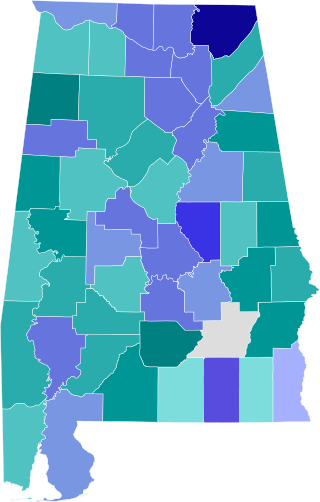
Joshua Lawrence Chamberlain was an American college professor and politician from Maine who volunteered during the American Civil War to join the Union Army. He became a highly respected and decorated Union officer, reaching the rank of brigadier general. He is best known for his gallantry at the Battle of Gettysburg, leading a bayonet charge, for which he was awarded the Medal of Honor.

The 1876 South Carolina gubernatorial election was held on November 7, 1876, to select the governor of the state of South Carolina. The election campaign was a referendum on the Radical Republican-led state government and their Reconstruction policies. Opponents disputed the challenger Wade Hampton III's victory, gained by a margin of little more than 1100 votes statewide. But he took office in April 1877, after President Hayes withdrew federal troops as a result of a national Democratic compromise, and the incumbent Daniel Henry Chamberlain left the state.

The 1874 South Carolina gubernatorial election was held on November 3, 1874, to select the governor and lieutenant governor of the state of South Carolina. Daniel Henry Chamberlain won the election and became the 76th governor of South Carolina.
The Massachusetts Republican Party (MassGOP) is the Massachusetts branch of the U.S. Republican Party.

William George Crosby was an American politician and the 23rd Governor of Maine. A Whig, Crosby served two single-year terms as governor from 1853 to 1855.

The 1845 Alabama gubernatorial election took place on August 4, 1845, in order to elect the governor of Alabama. Term started on December 10, 1845. Independent Joshua L. Martin won his only term as Governor with 53.5% of the vote.

The 1867 Vermont gubernatorial election took place on September 3, 1867. In keeping with the "Mountain Rule", incumbent Republican Paul Dillingham was not a candidate for another term as governor of Vermont. The Republican nomination was won by John B. Page, who had previously served as Vermont State Treasurer. The Democratic nomination was won by John L. Edwards of Newport, who had previously served as State's Attorney of Orleans County. In the general election, Page was elected to a one-year term as governor.

The 1909 Massachusetts gubernatorial election was held on November 2, 1909. Incumbent Governor Republican Eben S. Draper was re-elected, defeating Democratic nominee James H. Vahey with 48.64% of the vote.

The 1962 New Hampshire gubernatorial election was held on November 6, 1962. Democratic nominee John W. King defeated Republican nominee John Pillsbury with 58.89% of the vote.

The 1964 New Hampshire gubernatorial election was held on November 3, 1964. Incumbent Democrat John W. King defeated Republican nominee John Pillsbury with 66.77% of the vote.

The 1954 South Dakota gubernatorial election was held on November 2, 1954.

The 1819 Vermont gubernatorial election for Governor of Vermont took place in September and October, and resulted in the election of Jonas Galusha to a one-year term.

The 1867 Massachusetts gubernatorial election was held on November 5.

The 1866 Delaware gubernatorial election was held on November 6, 1866. On March 1, 1865, Republican Governor William Cannon died in office, elevating State Senate Speaker Gove Saulsbury, a Democrat, to the governorship. Saulsbury ran for re-election in 1866, the first Governor to do so since Joshua Clayton in 1792. He faced Republican nominee James Riddle, a prominent industrialist. Saulsbury defeated Riddle by a decisive margin, ushering in a large Democratic majority in both houses of the legislature.

The 1869 Maine gubernatorial election was held on September 13, 1869. Republican candidate and war hero Joshua Chamberlain defeated the Democratic candidate Franklin Smith and Prohibition candidate Nathan Griffith Hichborn.

The 1868 Maine gubernatorial election was held on September 14, 1868. Incumbent Republican governor and war hero Joshua Chamberlain defeated the Democratic candidate Eben F. Pillsbury.

The 1866 Maine gubernatorial election was held on September 10, 1866. Republican candidate and war hero Joshua Chamberlain defeated the Democratic candidate Eben F. Pillsbury.

The 1867 Maryland gubernatorial election took place on November 5, 1867. Incumbent Governor Thomas Swann did not run for re-election.

The 1895 Maryland gubernatorial election took place on November 5, 1895.




















